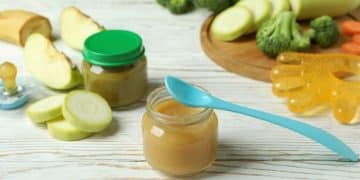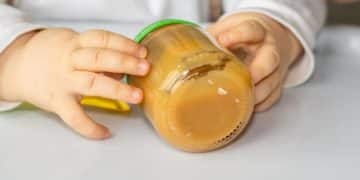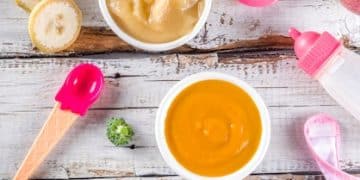Organic vs. Non-Organic Baby Food: Is It Really Worth the Extra Cost?
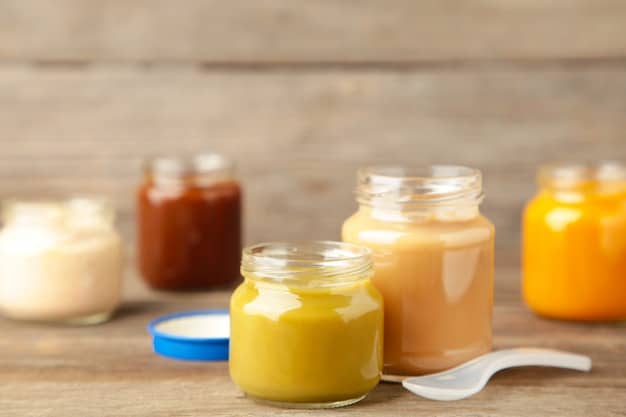
Organic baby food is produced without synthetic pesticides or fertilizers, potentially reducing a baby’s exposure to harmful chemicals, while non-organic options, though often cheaper, may contain traces of these substances, leading to ethical and health considerations for parents deciding between the two.
Navigating the world of baby food can be overwhelming, especially when trying to decide between organic and non-organic options. Is the extra cost of organic vs. non-organic baby food: Is it worth the extra 15%? Today we are diving into the world of baby food in order to address this topic.
Understanding Organic Baby Food
Organic baby food is created by following strict guidelines set by regulatory bodies, ensuring that it is produced without synthetic pesticides, herbicides, or fertilizers. This production method aims to reduce the potential exposure of infants to harmful chemicals, aligning with the growing concern for cleaner and safer food options.
What Does “Organic” Really Mean?
The term “organic” when applied to baby food indicates that the ingredients have been grown and processed according to specific standards that prohibit the use of synthetic pesticides, genetically modified organisms (GMOs), and artificial preservatives. These standards are designed to promote environmental sustainability and reduce health risks associated with chemical exposure.
- No Synthetic Pesticides: Organic farming avoids the use of man-made pesticides, relying instead on natural methods for pest control.
- Non-GMO: Organic baby food ensures ingredients are free from genetic modification.
- No Artificial Additives: The exclusion of artificial colors, flavors, and preservatives aims to provide pure and wholesome nourishment for babies.
Choosing organic baby food can provide peace of mind to parents who want to limit their child’s exposure to potentially harmful substances during a crucial stage of development.

Benefits of Choosing Organic
Selecting organic baby food offers numerous advantages, primarily centered on reducing babies’ exposure to potentially harmful chemicals and promoting better health outcomes. The stringent standards governing organic farming and food processing contribute to a safer and more nutritious diet for infants during their critical developmental stages.
Reduced Pesticide Exposure
One of the most significant benefits of organic baby food is minimizing exposure to synthetic pesticides. Studies have shown that pesticides can pose health risks to infants and young children, whose developing bodies are more vulnerable to their effects.
Higher Nutrient Content
Some research suggests that organic foods may have higher levels of certain nutrients compared to their non-organic counterparts. For instance, organic crops are sometimes found to have higher concentrations of vitamins, minerals, and antioxidants.
- Healthier Development: Reduced exposure to harmful chemicals supports healthy brain and body development.
- Stronger Immune System: Nutrient-rich organic foods can help strengthen a baby’s immune system.
- Long-Term Health: Early adoption of organic foods may set the stage for a lifetime of healthier eating habits.
By opting for organic baby food, parents can take a proactive step towards safeguarding their child’s health and well-being.
Understanding Non-Organic Baby Food
Non-organic baby food is produced using conventional farming methods, which allow the use of synthetic pesticides, herbicides, and fertilizers. While these methods can result in higher yields and lower costs, they also raise concerns about potential health risks associated with chemical residues in food.
What is Conventional Farming?
Conventional farming relies on synthetic inputs to maximize crop yields and control pests and diseases. This approach often involves the use of chemical fertilizers, pesticides, and herbicides, which can leave residues on or in the food products.
Conventional farming has long been criticized for its potential impact on the environment and public health. Synthetic pesticides can harm beneficial insects, contaminate water sources, and lead to soil degradation. The health risks associated with pesticide exposure are particularly concerning for infants and young children.
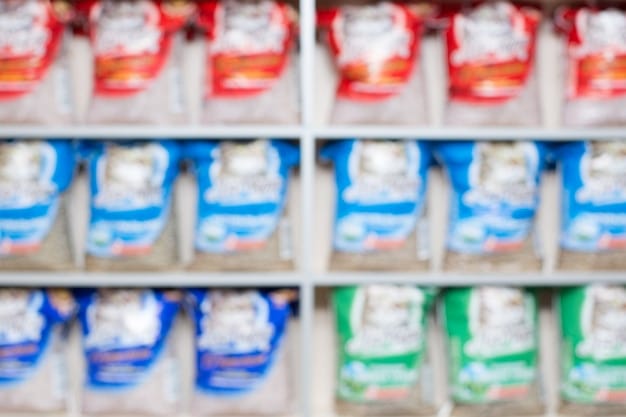
Potential Risks of Non-Organic Options
Choosing non-organic baby food may pose certain risks due to the use of synthetic pesticides and other chemicals in conventional farming. These risks primarily revolve around potential health concerns for infants, whose developing bodies are more susceptible to the adverse effects of these substances.
Pesticide Residue Concerns
Non-organic baby food may contain pesticide residues, which can be harmful to infants and young children. Chronic exposure to even low levels of pesticides has been linked to developmental problems, neurological issues, and certain types of cancer.
GMOs and Additives
Non-organic baby food may also contain genetically modified organisms (GMOs) and artificial additives, which some parents prefer to avoid.
- Developmental Issues: Exposure to pesticides and GMOs can potentially disrupt normal development in infants and children.
- Allergies and Sensitivities: Artificial additives may trigger allergic reactions or sensitivities in some babies.
- Long-Term Health Risks: Early exposure to certain chemicals may increase the risk of chronic diseases later in life.
While non-organic baby food is generally considered safe by regulatory agencies, the potential risks associated with pesticide exposure and other chemicals often lead parents to opt for organic alternatives.
Cost Comparison: Organic vs. Non-Organic
One of the most significant considerations for parents when choosing between organic and non-organic baby food is the cost. Organic baby food typically comes with a higher price tag compared to its non-organic counterpart. This price difference reflects the higher production costs associated with organic farming and processing.
The price difference is not always substantial, but it can add up over time, especially for families on a tight budget. Some parents may find it challenging to justify the extra expense of organic baby food, particularly if they are already struggling to make ends meet.
Budget-Friendly Tips
Despite the higher cost of organic baby food, there are several ways parents can make it more affordable.
- Make Your Own: Preparing homemade baby food using organic ingredients can be more cost-effective than buying pre-made organic options.
- Buy in Bulk: Purchasing organic baby food in bulk can help reduce the cost per serving.
- Look for Sales and Coupons: Keep an eye out for sales and coupons on organic baby food to save money whenever possible.
By implementing these strategies, parents can potentially reduce the financial burden of choosing organic baby food without compromising on their commitment to providing safer, healthier nutrition for their little ones.
Making the Right Choice for Your Baby
Choosing between organic and non-organic baby food is a personal decision that depends on various factors, including your budget, values, and beliefs. There is no one-size-fits-all answer, and what works for one family may not work for another.
Factors to Consider:
When weighing your options, here are some factors to consider:
- Budget: Can you comfortably afford the extra cost of organic baby food?
- Values: Do you prioritize organic and sustainable farming practices?
- Health Concerns: Do you have any specific health concerns about pesticide exposure or other chemicals?
When deciding what is best for your baby, it’s important to consider all factors involved. Ultimately, the choice between organic and non-organic baby food depends on your individual circumstances and priorities. Both options can provide nutritious meals for your baby, but organic choices may offer added benefits in terms of reduced chemical exposure.
| Key Point | Brief Description |
|---|---|
| 🌱 Organic Baby Food | Made without synthetic pesticides, GMOs, or artificial additives. |
| 💰 Cost | Organic options are pricier but may offer peace of mind. |
| ⚠️ Pesticide Exposure | Non-organic foods may contain pesticide residue, a concern for infants. |
| 🍎 Homemade | Making your own organic baby food saves money. |
[Título da seção FAQ em en-US]
Frequently Asked Questions
▼
Organic baby food reduces exposure to synthetic pesticides but may not always be nutritionally superior. Check labels for nutrient content.
▼
Consider making your own organic baby food at home, buying in bulk, and looking for sales and coupons to reduce costs.
▼
Yes, non-organic produce is generally safe but washing them thoroughly before serving can eliminate some of the harmful residue.
▼
“Organic” signifies adherence to strict farming and production that prohibit synthetic pesticides, GMOs, and artificial additives.
▼
It depends on your budget, values, and health concerns. It is a personal decision that should consider all personal factors you have.
Conclusion
The choice between organic and non-organic baby food is deeply personal, influenced by factors like budget, values, and health concerns. While organic options promise reduced pesticide exposure and potentially higher nutrient content, non-organic choices offer a more budget-friendly alternative. By carefully considering these factors and staying informed, parents can make confident decisions that align with their priorities and provide the best possible nourishment for their babies.
